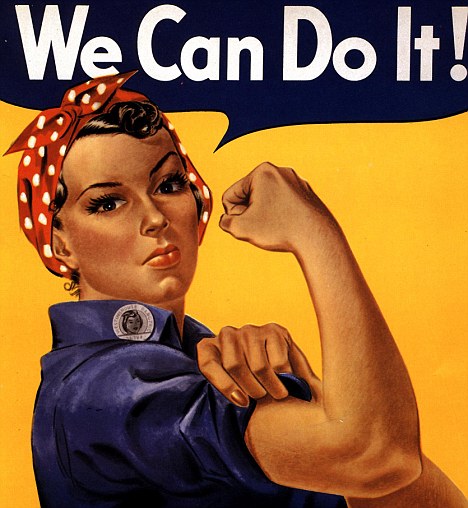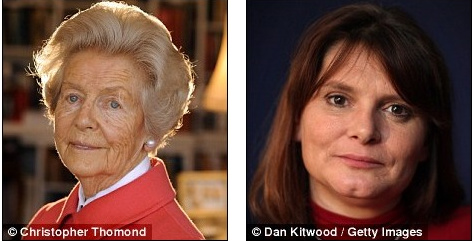 |
Original Source:
MAIL: 08 MAY 2010 |
By Judith Woods
Last updated at 8:01 PM on 8th May 2010 |
|
|
|
|
In an age where public tears are de rigueur, is it any wonder that we
admire women who demonstrate dignity and composure under the most
testing of circumstances? Bring back the stiff upper lip, says Judith
Woods
 |
|
J Howard
Miller's celebrated poster of 1942, which urged US women to
participate in the war effort |
When jazz singer Dame Cleo Laine took to the stage last February before
an audience of 400, no one expected her celebrated musical partner Sir
John Dankworth to be present, as he had been ill for some months. She
gave a bravura performance, alongside the couple’s adult children,
Jacqui and Alec, before announcing – just before the finale – that her
husband of 52 years had died earlier that day. The news was met with
stunned silence, as onlookers sought to process first the fact of his
death and then her astonishing ‘show must go on’ chutzpah.
Afterwards, those close to her revealed that because the concert was
being held to mark the 40th anniversary of the venue she and Sir John
had created at their Buckinghamshire home, she wanted the celebration to
go ahead and ‘didn’t want to bring the audience down’. There was
something extraordinarily touching – and rather wonderfully
old-fashioned – about the way Laine was determined to sublimate her
grief temporarily for the sake of others.
Such gracious stoicism, which came so naturally to her, is in short
supply in 21st-century Britain. We live in an age where public tears are
de rigueur, so much so that the parents of
Madeleine
McCann
were vilified and viewed with suspicion for not
breaking down in front of the cameras as they spoke about their
daughter’s disappearance. Sportsmen routinely weep on television,
whether they win, lose or resign. Nor are politicians immune – take
Gordon Brown
and his infamous interview with Piers Morgan in February. But when did
our traditional stiff upper lip get jettisoned for a wobbly lower lip?
Social commentators invariably trace the roots of such behaviour to the
Diana Effect: the death of the Princess of Wales in 1997, aged just 36,
precipitated a mass outpouring of emotion that was previously unheard
of, and once the collective waterworks were turned on, it has proved
impossible to turn them off again. As a result, we’ve either become a
modern society in touch with our feelings, or a ‘sloppy and sentimental’
culture, as the Duchess of Devonshire, Deborah Cavendish, recently put
it.
 |
|
True grit,
from left: Cleo Laine, Kate McCann |
 |
|
The
Duchess of Devonshire, Sara Payne |
The last of the Mitford sisters, who between them courted and endured
more than their share of scandal and tragedy, Deborah is due to publish
an autobiography, Wait For Me, later this year. Now 90, she finds
herself recoiling at the ‘self-pity’ and ‘bellyaching’ that passes for
popular discourse – and it’s hard not to agree with her to an extent. Is
it any wonder, then, that we gasp in admiration at resilient women who
demonstrate such inner strength under pressure that they shine like
beacons amid the relentless coverage of poor-me celebrities bleating on
about their weight-gain ‘hell’ or the ‘tragic’ loss of yet another
rutting footballer boyfriend?
Take
Sara Payne,
the mother of murdered schoolgirl Sarah, who, prior to a stroke earlier
this year, campaigned tirelessly in the field of child protection after
her daughter’s death at the hands of paedophile Roy Whiting in 2000. Or
Christina Schmid, who delivered an eloquent eulogy at the funeral of her
husband Olaf, a staff sergeant and bomb-disposal expert who was killed
in Afghanistan at the end of last year. At the service in Truro
Cathedral she paid unflinching tribute to her ‘warrior’ hero and best
friend. As his coffin passed by, she remained composed, cutting a lonely
yet dignified figure. Since then she has taken every opportunity to
speak out on behalf of our armed forces.
|
|
|
|
These resilient women shine like beacons amid the poor-me
celebs bleating on about their weight-gain ‘hell’ or the ‘tragic’ loss
of yet another rutting footballer boyfriend |
‘I do believe that most women are hard-wired to cope with whatever life
throws at them, and some are extraordinary in the way that they deal
with the most horrendous crises,’ says life coach Fiona Harrold. ‘It may
be a cliché that behind every successful man there’s a strong woman, but
it’s true. Women have a nurturing gene and are instinctive facilitators;
they see their role as enabling their husbands and their children to go
out into the world and fulfil their potential, while they keep the
foundation of the family solid. When a man loses his job, for example,
he can often go to pieces, partly because deep down he knows his partner
will hold everything together.’
Francesca, 41, says that since her husband lost his job in construction
management eight months ago, she has had to cope with the fallout.
‘Justin was devastated; it really hit his self-esteem, so I stepped up
to the plate. I went from part-time to full-time work, roped in my aunt
to help with childcare, sacked the cleaner, and still managed to
organise my parents’ 40th wedding anniversary party. Justin’s a bit of
an alpha male and, weird though it sounds, being the one helping the
family through this is giving me a glow of satisfaction – although it’s
been a while now and I do hope he gets a job soon.’
 |
|
The show
must go on: war widow Christina Schmid, Pauline Prescott |
 |
|
Jackie
Kennedy, Eleanor Roosevelt |
When it comes to family dynamics, art often imitates life, and it’s a TV
truism that powerful matriarchs are what make a soap storyline sing. The
pouting ingénues and handsome, wayward lads are ten a penny; it’s the
women of a certain age who are the real stars of the show as they draw
up battlelines, hold firm and wrest their menfolk from the jaws of
disaster.
In the world of Westminster – arguably the longest-running am-dram
production of all – wives are invariably called upon to rise above the
ghastly humiliation of their adulterous MP husbands. So they pose for
show-of-unity pictures at their country retreat, leaning on a five-bar
gate with the mandatory labrador in tow, even though they’d much rather
batter their errant spouse round the head with a Le Creuset pot. What a
cheer went up, then, when Pauline Prescott valiantly refused to allow
her philandering spouse John to pack her off to his official residence
at Dorneywood
in Buckinghamshire when the press got wind of his two-year affair with
his secretary Tracey Temple in 2006.
Instead, doughty Mrs Prescott stood her ground, and it was the former
deputy prime minister who was forced to flee the constituency home in
Hull, while she calmly put on her lipstick and made tea for the builders
who were carrying out renovation work. ‘I was about to have a loo put in
my hall. John said I’d have to cancel all that, but I didn’t,’ she wrote
in her autobiography, Smile Though Your Heart is Breaking. ‘The
photographers were all up here, but when the builders were going for
their lunch I’d sneak out and go to Asda. They caught the plumber going
in with the loo. The headline was “Everything’s going down the pan at
the Prescotts!” I’m being flippant – it was an awful time – but you’ve
got to keep a sense of humour. I felt like locking myself away. But
after a week I just carried on as normal.’
|
|
|
|
‘Women are hard-wired to cope with whatever life throws
at them, and some are extraordinary in the way that they deal with the
most horrendous crises’ |
What enabled her to keep her chin up wasn’t just her determination to
have that loo, but a sense of responsibility; to the builders, to see
through the project she’d started, and to her own moral values.
Weathering such a betrayal in the eye of a media storm is no mean feat,
and it is testament to the eminently likable Mrs P that she emerged from
the whole business unscathed and well-respected. Being in the spotlight
is an added strain when things go awry, as all high-profile women
invariably discover.
‘After JFK died, Jackie Kennedy was applauded for her composure and the
way
she led the country in mourning,’ says psychologist Cliff Arnall. ‘One
reason why she was able to show such strength in public was because she
had a lot of support. When you have people around you to whom you can
bare your soul – as most women do – then it’s possible to “keep up
appearances” when you have to.’ Because women are accustomed to
functioning on an emotional level, they are skilled at recognising,
analysing and working through emotional crises, whereas men may find
themselves overwhelmed or nonplussed.
‘I work a lot with older people,’ adds Arnall, ‘and men generally don’t
fare very well when their wives die, whereas women are much more likely
to move forward, maybe taking up a new activity or re-energising their
social lives.’
So let’s pay tribute to – and take inspiration from – these spirited,
stout-hearted women who show us all the meaning of true grit. In the
words of Eleanor Roosevelt, another US First Lady who went on to make
her own mark on the world for many years after her husband Franklin’s
death in 1945: ‘Women are like teabags – you never know how strong they
are until they get into hot water.’ |
|
 |
|







